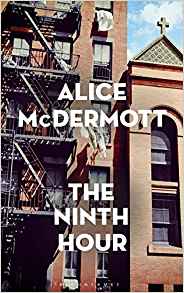The Ninth Hour
In the early 1900s in immigrant-packed Brooklyn, a young Irish husband commits suicide, a grievous and unpardonable sin for Catholics. He leaves behind a pregnant and unsuspecting wife. It is at this moment that the story begins with an unsolicited act of kindness which sets the theme for the entire novel. Sister St. Saviour, a Little Sister of the Sick Poor, happens upon the scene and is summoned in by two policemen. An older nun, she immediately takes over, trying to comfort the widow and assure the dead man is given a Christian burial.
The young widow, Annie, is given a job working with the convent’s laundress, Sister Illuminata. Eventually, Annie and her daughter, Sally, establish a simple but comfortable routine among the hard-working and saintly nuns. Sally considers becoming a nun herself but inwardly knows she’d rather punch evil people in the nose. Even one of the nuns, beloved Sister Jeanne, considers herself a “pagan” in reality. The book goes on to examine how the man’s suicide subtly impacts every facet of succeeding generations’ lives, including that of family, friends and, of course, the nuns.
Full disclosure: As a big-city born and raised Irish immigrant family kid with 13 years of Catholic education, I related to every sentence of this book. The author dazzles with the sheer majesty of her prose and the vivid and stark historical accuracy of the times. The Ninth Hour humanizes the urban nuns who were real, admirable and seemingly indispensable to the neighborhoods, not the comic caricatures of modern-day script writers. Despite the fact that many of the male characters are not portrayed positively, this is no feminist screed. This emotional book will raise both readers’ IQs and their spirits. A must read.










